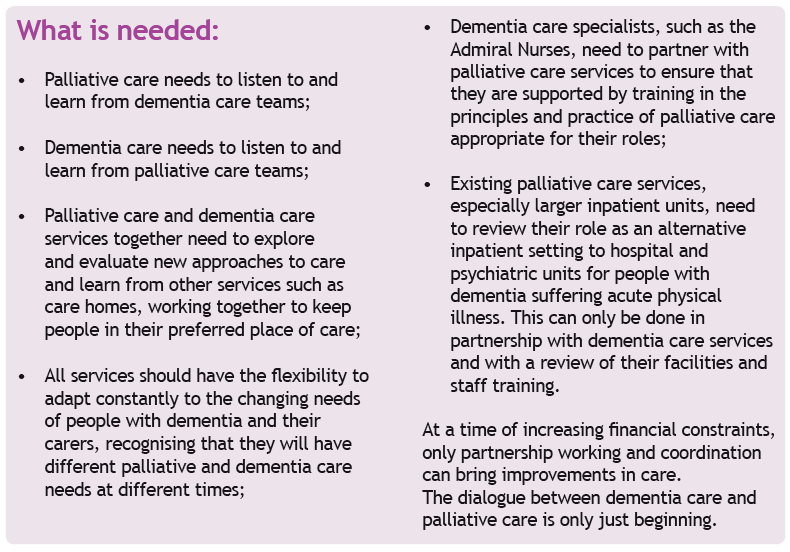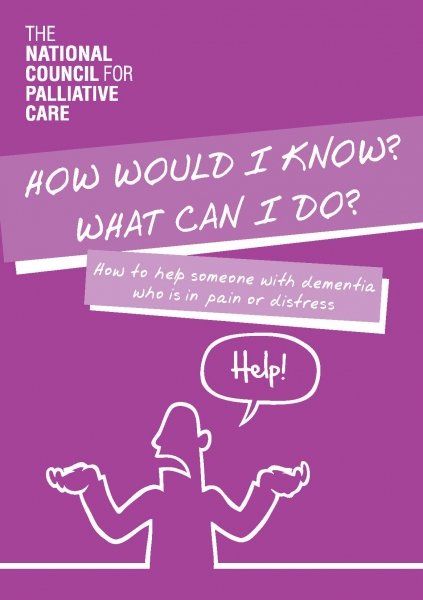Dementia
Achieving a good death for people with dementia
Why is end of life care for people with dementia important?
The number of people in the UK with dementia is increasing, with 1 in 3 people over the age of 65 now dying with dementia. Despite there being no cure, only 18% of people realise dementia is a terminal illness.
Dementia affects almost every one of us. Greater awareness is needed around how it affects peoples’ lives, from diagnosis until the very end of life.
Planning ahead early on
Our Prezi slide show, presented at the UK Dementia Congress in Brighton on November 1st 2012, talks about the importance of planning for the end of life early on in dementia:
Early diagnosis, followed by conversations and planning, is essential in ensuring that people with dementia can feel confident that their preferences and concerns about the end of life are known and will be acted upon when the time comes.
The progressive nature of dementia and its impact on cognition presents people with dementia, their family and friends with major losses that can make the journey very difficult for those involved. However, these challenges can be made more manageable by early discussions and planning. This process is sometimes referred to by professionals as 'advance care planning' and documents such as Preferred Priorities for Care can be used to help record preferences and decisions.
The All Party Parliamentary Group (APPG) on Dementia held an inquiry in 2012 on improving dementia diagnosis rates in the UK. To read NCPC’s response to the inquiry, please click here. To read the inquiry’s final report, please click here.
NCPC and the Dying Matters coalition have produced a volume of work which encourages conversations to be held about the end of life. Difficult Conversations: for dementia for example, deals with different ways in which discussing end of life care can be approached.
Ensuring high-quality services are available
Our dedicated Dementia Group has worked hard to identify and share models of good practice in dementia and palliative care, and supported commissioner to adopt these in several areas. Our publications The Power of Partnership: Palliative care in dementia and Out of the Shadows: End of life care for people with dementia (both available in the NCPC library) set out the hallmarks of good practice.

Excerpt from The Power of Partnership: Palliative care in dementia (2009) NCPC
Although many palliative care services now care for people with conditions other than cancer, people with dementia are infrequently referred to, or cared for by, palliative care services. Our Minimum Data Set has shown that specialist palliative care day care services saw only 9 people with a primary diagnosis of dementia in 2010/11. Dementia often co-exists alongside other conditions, so many more people could be accessing specialist palliative care, but are not being recorded. We have recommended that services review their admission policies, internal monitoring and staff education programmes to ensure that people with dementia have full access to hospice care.
Our work over many years has shown that partnership working between dementia care and palliative care services is key to achieving flexible, responsive services which help deliver a good death for all those with the condition.
Support for carers
Carers – by whom we mean people who provide unpaid support to a family member or friend – are a crucial, but too often overlooked, part of end of life care. A diagnosis of dementia not only has a significant effect on the person but it also has a great effect on the family and friends supporting them.
Carers of people with dementia (and other degenerative conditions) often report not knowing what the person wanted at the end of life, having not been able or prompted to talk about this sooner. This can lead to a considerable amount of distress or guilt being felt by the carer as they feel that the person with dementia did not receive the death they would have wanted.
For more information on caring for someone at the end of life, please click here.
Recent activities
NCPC have been working to improve care and support for people with dementia approaching the end of life and their families for the last seven years.
Click here to view a timeline of our activities since 2006.
More recently:
The Prime Minister's Dementia Challenge
The Prime Minister's Dementia Challenge, launched in March 2012, offers a major opportunity to improve end of life care for people with dementia. NCPC is a member of Number 10's Care and Support Champion Group which is leading the work ensuring people with dementia receive high quality care and support from diagnosis until the very end of life.
The initiative was discussed at NCPC's 7th Annual Conference on Dementia & End of Life, Rising to the Prime Minister's Dementia Challenge, on 4th December 2012 in London.
Click here to view our short briefing outline the role of end of life care in the PM's Dementia Challenge.
Pain and distress in advanced dementia 
As part of the Dementia Challenge NCPC was asked by Number 10 to produce guidance helping professionals and unpaid carers address pain & distress for people with dementia. This is sometimes called 'challenging behaviour', and is too often under addressed.
Please click here to read about our new guidance How would I know? What can I do?, launched at our seventh annual conference in December 2012
Other useful resources to measure and address pain:
- SCIE information on pain experienced by people with advanced dementia www.scie.org.uk/publications/dementia/endoflife/pain.asp
- More links coming soon
7th Annual Conference on Dementia & End of Life (December 2012)
A copy of the programme and presentations from this conference can be found here.
Useful resources
All resources are available to NCPC subscribers, free of charge, from our online Library. For more information on any of these documents, please email enquiries@ncpc.org.uk.
- NCPC’s Good Decision-Making – the Mental Capacity Act and End of Life Care: Summary Guidance
- Difficult Conversations: Making it easier to talk to people with dementia about the end of life.
- NCPC’s The Power of Partnership: Palliative care in dementia
- NCPC’s Out of the Shadows: End of life care for people with dementia
Useful links
- National End of Life Care Programme Dementia resource guide www.endoflifecareforadults.nhs.uk/publications/care-towards-the-end-of-life-for-people-with-dementia
- Life story work www.dementiauk.org/information-support/life-story-work/
- Information and podcasts for people caring for people with dementia www.caregivercollege.org/scoa/?PainandDementia.html
- E-learning website about dementia www.scie.org.uk/assets/elearning/dementia/dementia01/resource/flash/index.html